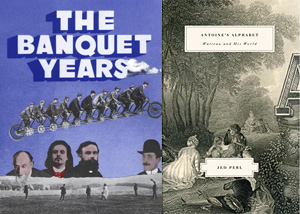
Wyatt Mason is iced-in in New England, without power or Internet access, and transmits this week’s Weekend Read by telephone.
“I propose an essay on Roger Shattuck written by Jed Perl and published in the November 5 The New Republic. Shattuck was a great critic, the author of The Banquet Years (Vintage), about the birth of modern art in France; it has not gone out of print in 50 years. Shattuck passed away in 2005. Today I find myself thinking of him because he was a hardy New Englander who spent much of his life in Vermont:
He was a reticent man, and I imagine that he counted on his reticence to carry him through many a bumpy time. Shattuck had been an army pilot during World War II, and there was about him a physical aplomb that many will associate with the aviator’s skills, a connection between the craft of flying and certain personal qualities that he himself acknowledged in an essay about the Wright Brothers that he published in The New York Review of Books toward the end of his life…. With his elegantly etched features and trim athletic physique, he had the aura of a cool customer, and nobody without that kind of inner confidence could have kept his head after the success of The Banquet Years, a book which in the decade after its publication came to be associated with the yeasty, unpredictable, improvisational, anti-formalist side of the modern movement. The Banquet Years fit right in with a new mood that was overtaking American campuses and theaters and museums in the 1960s, and was reflected in the fast-growing enthusiasm for Duchamp, in the performances of the Living Theater, and in the essays collected in Susan Sontag’s Against Interpretation. The art-collecting protagonist of B.H. Friedman’s novel Whispers, published in 1972, picks up a copy of the paperback edition of The Banquet Years at LaGuardia Airport and reflects that the 1960s are the Banquet Years all over again, only new and improved.
“Perl, the author of the excellent Antoine’s Alphabet (Knopf), is one of our finest critics. His essay reminds us of what we lost when Shattuck died. It puts forth all the qualities that readers should miss in Shattuck–but, also, that they have today in Perl (both men, by the way, contributors to Harper’s).
“Thus, iced-in in New England, I suggest Jed Perl’s ‘Half Tame’ as your Weekend Read.”


